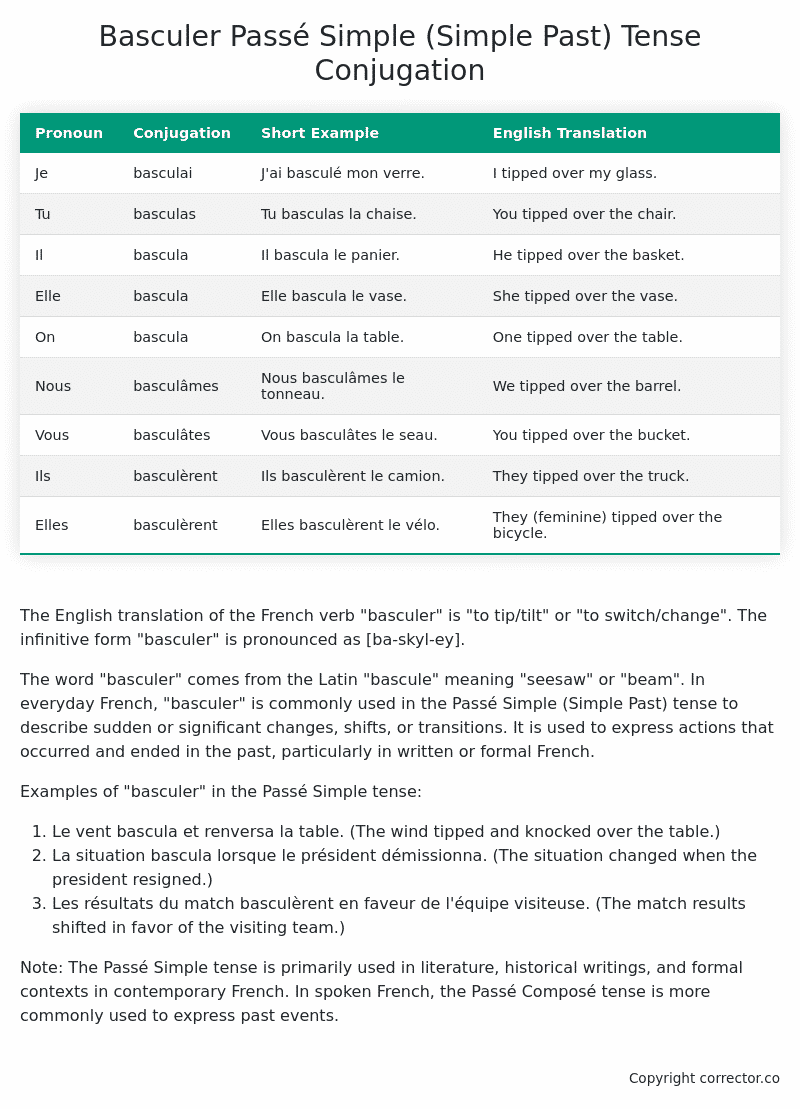Passé Simple (Simple Past) Tense Conjugation of the French Verb basculer
Introduction to the verb basculer
The English translation of the French verb “basculer” is “to tip/tilt” or “to switch/change”. The infinitive form “basculer” is pronounced as [ba-skyl-ey].
The word “basculer” comes from the Latin “bascule” meaning “seesaw” or “beam”. In everyday French, “basculer” is commonly used in the Passé Simple (Simple Past) tense to describe sudden or significant changes, shifts, or transitions. It is used to express actions that occurred and ended in the past, particularly in written or formal French.
Examples of “basculer” in the Passé Simple tense:
- Le vent bascula et renversa la table.
(The wind tipped and knocked over the table.) - La situation bascula lorsque le président démissionna.
(The situation changed when the president resigned.) - Les résultats du match basculèrent en faveur de l’équipe visiteuse.
(The match results shifted in favor of the visiting team.)
Note: The Passé Simple tense is primarily used in literature, historical writings, and formal contexts in contemporary French. In spoken French, the Passé Composé tense is more commonly used to express past events.
Table of the Passé Simple (Simple Past) Tense Conjugation of basculer
| Pronoun | Conjugation | Short Example | English Translation |
|---|---|---|---|
| Je | basculai | J’ai basculé mon verre. | I tipped over my glass. |
| Tu | basculas | Tu basculas la chaise. | You tipped over the chair. |
| Il | bascula | Il bascula le panier. | He tipped over the basket. |
| Elle | bascula | Elle bascula le vase. | She tipped over the vase. |
| On | bascula | On bascula la table. | One tipped over the table. |
| Nous | basculâmes | Nous basculâmes le tonneau. | We tipped over the barrel. |
| Vous | basculâtes | Vous basculâtes le seau. | You tipped over the bucket. |
| Ils | basculèrent | Ils basculèrent le camion. | They tipped over the truck. |
| Elles | basculèrent | Elles basculèrent le vélo. | They (feminine) tipped over the bicycle. |
Other Conjugations for Basculer.
Le Present (Present Tense) Conjugation of the French Verb basculer
Imparfait (Imperfect) Tense Conjugation of the French Verb basculer
Passé Simple (Simple Past) Tense Conjugation of the French Verb basculer (You’re reading it right now!)
Passé Composé (Present Perfect) Tense Conjugation of the French Verb basculer
Futur Simple (Simple Future) Tense Conjugation of the French Verb basculer
Futur Proche (Near Future) Tense Conjugation of the French Verb basculer
Plus-que-parfait (Pluperfect) Tense Conjugation of the French Verb basculer
Passé Antérieur (Past Anterior) Tense Conjugation of the French Verb basculer
Futur Antérieur (Future Anterior) Tense Conjugation of the French Verb basculer
Subjonctif Présent (Subjunctive Present) Tense Conjugation of the French Verb basculer
Subjonctif Passé (Subjunctive Past) Tense Conjugation of the French Verb basculer
Subjonctif Imparfait (Subjunctive Imperfect) Tense Conjugation of the French Verb basculer
Subjonctif Plus-que-parfait (Subjunctive Pluperfect) Tense Conjugation of the French Verb basculer
Conditionnel Présent (Conditional Present) Tense Conjugation of the French Verb basculer
Conditionnel Passé (Conditional Past) Tense Conjugation of the French Verb basculer
Conditionnel Passé II (Conditional Past II) Tense Conjugation of the French Verb basculer
L’impératif Présent (Imperative Present) Tense Conjugation of the French Verb basculer
L’impératif Passé (Imperative Past) Tense Conjugation of the French Verb basculer
L’infinitif Présent (Infinitive Present) Tense Conjugation of the French Verb basculer
L’infinitif Passé (Infinitive Past) Tense Conjugation of the French Verb basculer
Le Participe Présent (Present Participle) Tense Conjugation of the French Verb basculer
Le Participe Passé (Past Participle) Tense Conjugation of the French Verb basculer
Struggling with French verbs or the language in general? Why not use our free French Grammar Checker – no registration required!
Get a FREE Download Study Sheet of this Conjugation 🔥
Simply right click the image below, click “save image” and get your free reference for the basculer Passé Simple tense conjugation!

Basculer – About the French Passé Simple (Simple Past) Tense
Formation
Usage
Narration
Historical Context
Interactions with other tenses
Passé Composé
Imparfait
Conditional and Subjunctive
Summary
I hope you enjoyed this article on the verb basculer. Still in a learning mood? Check out another TOTALLY random French verb conjugation!


